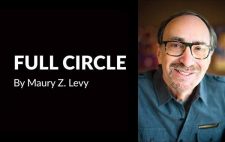When the sun got high and the spirits got low, the girls in clean dresses hopped and jumped their tattered ropes.
Most of the women, home for the day, laughed when they smiled and watched children play. Shirley Kowalski stared out her door, the door with the screens that protected her from the local wildlife. Shirley Kowalski was the kind of woman you saw in a magazine. Long blonde hair from an expensive bottle. Skin like silk, lips like cherries. She wore high heels and low tank tops, low enough to show some daytime cleavage.
The other women shook their heads. Their husbands just stared back. And when the stares got long, her temper got short.
“Whaddya lookin’ at?” she would yell, tugging her top like she was guarding a national treasure.
In between our ball games and watching all the girls, the boys laid on the grass and looked up at the world. We lay in silence and smelled the summer. Nothing could interrupt the aroma of fresh-cut grass. Nothing could cool the rays of the sun. Except for one shrill voice that pierced the perfection.
“It’s time to come in, mister.” My mother called me in a booming voice, a voice that could be heard around the corner. And by many ships at sea.
“You come in right now, you haven’t practiced all day.”
Practice. She was talking about piano practice. She had asked me, many months ago, if I wanted to play the piano. It was the days when rock was young, a time when Jerry Lee Lewis played the piano with his shoe. That seemed pretty cool to an 8-year-old boy. Sure, I’ll practice piano, and I’ll grow my hair like the Everly Brothers. Phil, not Don.
But practice? “My hands aren’t big enough to play the chords,” I told her. “I can’t stretch them that far.”
“But they’re big enough to throw a football and hit your father’s car,” she said, never losing an argument to an 8-year-old.
The problem was this: my piano teacher was Mr. Hoffenfeffer, and I hated him. I wanted to play rock, he wanted me to play the classics. “Claire de Lune,” he insisted. And whenever I said a discouraging word, he would just pull his cheap tie tighter, this man who wore the same grandpa-gray Robert Hall suit every single day.
“No,” he said, “just be quiet and play.”
My mother was no help. She blamed it all on me.
“We paid $800 for this piano,” she said. “Do you know how long your father has to work to earn $800?”
No, I didn’t. I wasn’t that good at math. All I knew was that my friends were all outside playing ball, having fun.
“If you don’t practice,” she said, “you can go straight to your room.”
And so it was. I went up and closed the door. My own private Idaho. I took out my red and black, fake leather 45 player and spun some tunes. “Wake Up, Little Susie,” “Good Golly Miss Molly.” I saw no end to it. I would live in my room for the rest of my life. I hated my mother.
And then the strangest thing happened. When Mr. Hoffenfeffer came the next Tuesday, he opened up his book and said, “I have a surprise for you.” And there it was. D-F-G-F-D. It was “Wake Up, Little Susie.” He was going to teach me to be an Everly Brother.
I looked at my mother, in shock and delight. And she just smiled. Years later, I learned that she had called Hoffenfeffer and told him what to teach me.
When the lesson was over, I ran back outside and told all my friends. I was going to be a rock ‘n’ roll star. They looked at me like I was crazy. I got that a lot.
Maury Z. Levy, former editorial director of Philadelphia Magazine, is the retired chairman of Levy Jacobs Marketing in Marlton. Email Maury at maury@levyjacobs.com.








